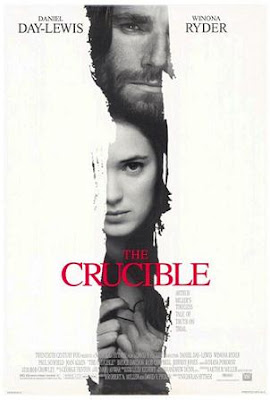Crimson
Peak is a perfectly serviceable ghost picture, and yet it feels
like a disappointment coming from director Guillermo del Toro. It's overly conventional when it needed to be bonkers. In 2006, Del
Toro galvanized us with Pan’s Labyrinth,
a film that so elegantly encompassed both the magical and the macabre. He has
the eye of a painter, like most if not all of the great horror maestros, and he
imbues Crimson Peak with the same
visually striking aesthetic we’ve come to expect from him. The film is
beautiful, especially the first half, where we are more free to notice every
little detail: the patterned wallpaper in the heroine’s bedroom, the fringe on
a brown-orange floor rug, the way the mourners in a funeral scene look like
crows in their black suits and dresses, the moment when Edith (played by Mia
Wasikowska) is writing in pen and accidentally rubs ink all over her forehead.
Something about the first half feels utterly alive, even as this part of the
film is a bit stagey.
In terms of structure, the first half is all set-up, and
as such it feels confined. You would expect del Toro to let his freak flag fly
in the second half, when we finally get to the haunted mansion, but then he
gets caught up in the details of the story and we never get to that fever
pitch, the kind of histrionic perversity you might see in a film by Dario
Argento. Gradually, the film trades its hypnotic effect for something more
dreary and gruesome. But del Toro grinds us through the familiars of the
haunted-house routine—a routine rife with creepy noises and dark passageways
and translucent specters—better than just about anyone else, so the movie is
still pleasurable. But in Pan’s Labyrinth,
del Toro created a narrative as surprising and strange as its milieu. After
that, it’s hard to be satisfied with the more conventional story of Crimson Peak, which requires nothing of
the viewer. And, while it’s admittedly fun to see old tropes given new and ever
more grotesque facades, it feels like a wasted opportunity from such an elegant
craftsman.
Crimson
Peak does have some things going for it. Namely: Tom
Hiddleston and Jessica Chastain. Hiddleston seems like a natural successor to
all the British leading men who led their unsuspecting young wives to creaking
old mansions full of secrets. And this is where del Toro smartly introduces
some complexity into the story. We know early on that Thomas Sharp
(Hiddleston’s character) is up to no good, that he has enticed the bland nymph
Edith to his isolated, moorish estate for ignoble purposes. But Thomas begins
truly to fall in love with Edith, ruffling the demoniac feathers of his
clinging, hateful sister Lucille, played to such chilly perfection by Jessica
Chastain. (There’s a great moment when Thomas and Edith return to the estate
after a night of carnal pleasure to find Lucille distraught with closeted rage:
She spills hot food all over the kitchen counter, and then runs her fingers
through the burning mess with a reserve and numbness only a psychotic can
muster.)
Jessica Chastain has always seemed burdened with the
weight of great acting skills. That weight has been a deficit in the past, but
in Crimson Peak she gets to play an
icy bitch to perfection. She doesn’t have to hold back in case it becomes
important that we like her. It is Lucille’s delicious wickedness that makes Crimson Peak interesting. Lucille is the
spawn of Mrs. Danvers and Rebecca from Daphne du Maurier’s novel Rebecca (or more likely the Alfred
Hitchcock film version). She’s calculating and obsessive but also desirable.
It’s ironic that both of these actresses, while very talented, are resolutely
bland performers. They flower when given the right material, and this material
suits Chastain’s id just right.
It doesn’t serve Mia Wasikowska as well. She somehow
doesn’t work for the movie. I liked her better as the spoiled-party-monster
vampire in Only Lovers Left Alive
(which also featured Tom Hiddleston, incidentally). Here, Wasikowska resorts to
the same ethereal-angelicism she employed as Jane Eyre. It makes her seem weak
and inconsequential, which isn’t entirely her fault: The movie spends about 45
minutes establishing her character as a semi-liberated New Woman—choosing to
stay at home working on her writing rather than go to the ball, taking charge
of her own life—and then deactivates her power. She does finally regain some agency
in the end, but Wasikowska doesn’t carry the film well. The movie truly belongs
to Hiddleston—so good at playing the tortured aristocrat—and Chastain.
There is an admittedly twisted and amusing joke running
through Crimson Peak: that the
brother-and-sister duo have been targeting wealthy young women in order to
maintain their fledgling estate. It’s a canny idea full of promise, especially
since there’s been such a resurgence of interest in pop culture about English
aristocrats who usually squander their fortunes, but del Toro doesn’t pursue it
with enough vigor. He’s too interested in paying homage to every ghostie that
ever graced the screen. His ghosties are legitimately creepy, but Crimson Peak never captures that
spine-tingling feeling you want from a good mystery-in-the-haunted-house
thriller. But you could do worse at Halloween.
With Charlie Hunnam, Jim Beaver, Burn Gorman, Leslie Hope,
and Jonathan Hyde. The gorgeous music is by Fernando Velásquez.







